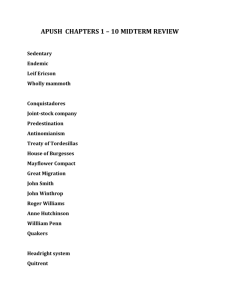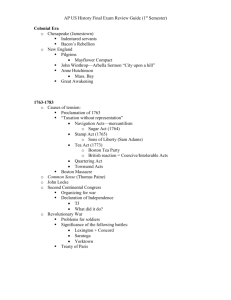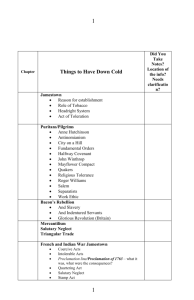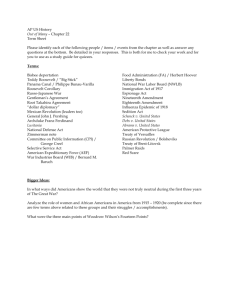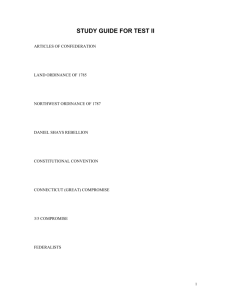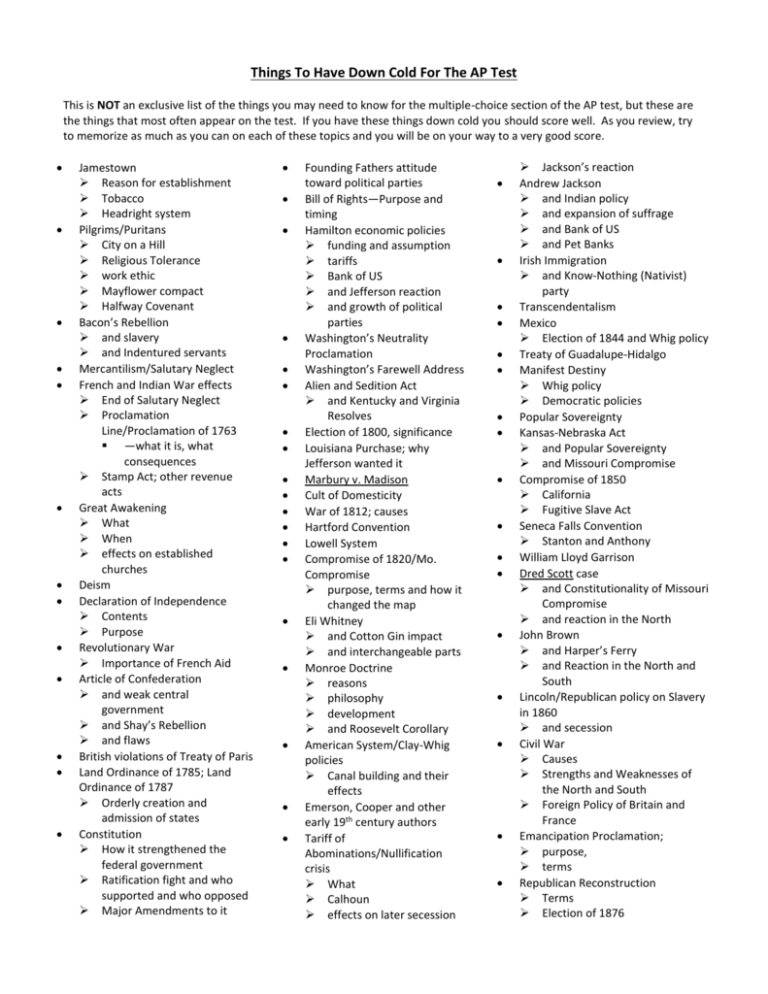
Things To Have Down Cold For The AP Test
This is NOT an exclusive list of the things you may need to know for the multiple-choice section of the AP test, but these are
the things that most often appear on the test. If you have these things down cold you should score well. As you review, try
to memorize as much as you can on each of these topics and you will be on your way to a very good score.
Jamestown
Reason for establishment
Tobacco
Headright system
Pilgrims/Puritans
City on a Hill
Religious Tolerance
work ethic
Mayflower compact
Halfway Covenant
Bacon’s Rebellion
and slavery
and Indentured servants
Mercantilism/Salutary Neglect
French and Indian War effects
End of Salutary Neglect
Proclamation
Line/Proclamation of 1763
—what it is, what
consequences
Stamp Act; other revenue
acts
Great Awakening
What
When
effects on established
churches
Deism
Declaration of Independence
Contents
Purpose
Revolutionary War
Importance of French Aid
Article of Confederation
and weak central
government
and Shay’s Rebellion
and flaws
British violations of Treaty of Paris
Land Ordinance of 1785; Land
Ordinance of 1787
Orderly creation and
admission of states
Constitution
How it strengthened the
federal government
Ratification fight and who
supported and who opposed
Major Amendments to it
Founding Fathers attitude
toward political parties
Bill of Rights—Purpose and
timing
Hamilton economic policies
funding and assumption
tariffs
Bank of US
and Jefferson reaction
and growth of political
parties
Washington’s Neutrality
Proclamation
Washington’s Farewell Address
Alien and Sedition Act
and Kentucky and Virginia
Resolves
Election of 1800, significance
Louisiana Purchase; why
Jefferson wanted it
Marbury v. Madison
Cult of Domesticity
War of 1812; causes
Hartford Convention
Lowell System
Compromise of 1820/Mo.
Compromise
purpose, terms and how it
changed the map
Eli Whitney
and Cotton Gin impact
and interchangeable parts
Monroe Doctrine
reasons
philosophy
development
and Roosevelt Corollary
American System/Clay-Whig
policies
Canal building and their
effects
Emerson, Cooper and other
early 19th century authors
Tariff of
Abominations/Nullification
crisis
What
Calhoun
effects on later secession
Jackson’s reaction
Andrew Jackson
and Indian policy
and expansion of suffrage
and Bank of US
and Pet Banks
Irish Immigration
and Know-Nothing (Nativist)
party
Transcendentalism
Mexico
Election of 1844 and Whig policy
Treaty of Guadalupe-Hidalgo
Manifest Destiny
Whig policy
Democratic policies
Popular Sovereignty
Kansas-Nebraska Act
and Popular Sovereignty
and Missouri Compromise
Compromise of 1850
California
Fugitive Slave Act
Seneca Falls Convention
Stanton and Anthony
William Lloyd Garrison
Dred Scott case
and Constitutionality of Missouri
Compromise
and reaction in the North
John Brown
and Harper’s Ferry
and Reaction in the North and
South
Lincoln/Republican policy on Slavery
in 1860
and secession
Civil War
Causes
Strengths and Weaknesses of
the North and South
Foreign Policy of Britain and
France
Emancipation Proclamation;
purpose,
terms
Republican Reconstruction
Terms
Election of 1876
Post Civil War southern society
sharecropping
Black Codes
Dawes Act
Transcontinental RR
and Government subsidies
and land grants
and effect on industry
Social Darwinism
Gospel of Wealth
Laissez faire economics
Titans of Industry
and business combinations
and horizontal and vertical
integration
Gilded-Age business cycles
Sherman Anti-Trust Act
and use against Unions
Populism
Policies
Why it failed
and southern racism
farmer discontent—why
Southern and Eastern European
immigrants—1880s
Growth of the Cities
and machine politics
and sanitation
and stratification of classes
Frederick Jackson Turner Thesis
Spanish American War
and Yellow Journalism
and Philippines
Open Door Policy
Frederick Douglas compared to
Du Bois
Progressivism
Reforms
Muckrakers
and city government
League of Nations
Terms
Reason Senate defeated
Mellon economic policies
Kellogg-Briand Pact
Naval Building limitations
World War II draft and difference
from WWI draft
Post WWI attitude of Americans
Ford/Model T/assembly line
Scopes Trial and cultural conflict
1920s literature
Lost generation
Sinclair Lewis
Plessy v. Ferguson—Brown v.
Board of Education
1930s Isolationism
and European debt issue
and causes
and consequences
Great Depressions
Causes
Hoover attitude toward welfare
and handouts
Labor Unions
and Gompers
and Lewis
and AFL
and CIO
and Wagner Act
and Taft Hartley Act
and immigrants
and Sherman Anti-Trust Act
Neutrality Acts
FDR
100 days legislation
differences with Hoover
court-packing
Good Neighbor Policy
lend-lease
World War II
and Japanese Internment
Camps
and Women in the
workforce
and racism
McCarthyism
1950s
and suburbs
and baby boom
and nuclear war scare
and domestic tranquility
and Rock and Roll
and consumerism
and economic boom
Truman
and Fair Deal
and Republican Congress
and Korean War
and Containment
and Cold War
and Berlin Airlift
and Greece
Sputnik
Cuban Missile Crisis
Vietnam
and Gulf of Tonkin
and Johnson
and Nixon
and Protests
Lyndon Johnson
and Great Society
Civil Rights
Civil Rights Movement
and Sit-Ins
and School Desegregation
and Martin Luther King
and March on Washington
and Radical Black Leaders
1960s Protests
and Vietnam
and counter-culture
and women’s movement
2
Decade Association
Place the correct decade, or group of years, beside each group of specific factual information. Remember, some items can fit into
more than one decade so be sure to read through and consider the entire group. Don’t simply go through the exercise mindlessly.
Think about
what each item is
how it relates to that particular decade
what other terms could be associated with it
Use the following groups of years in place of decades for the colonial period
o 1600-1650
o 1650-1700
o 1700-1750s
o After the 1750s use normal decades
____ ("long hot summers”, Freedom Summer, Greensboro sit-ins, U-2 incident, détente)
____ ("lost generation", Warren G. Harding, Henry Ford, Sacco and Vanzetti, Marcus Garvey)
____ (Agricultural Adjustment Adm. (AAA), phony war, Congress of Industrial Organization, brain trust, Huey Long (Kingfish))
____ (Alger Hiss, NSC 68, NATO, Casablanca Conference, Henry Wallace)
____ (American Colonization Society, Missouri Compromise, Era of Good Feelings, Tariff of Abominations, South Carolina Exposition)
____ (American Federation of Labor, Dawes Act, Alfred Thayer Mahan, horizontal integration/vertical integration, Haymarket Square
Incident)
____ (baby boomers, Sputnik, beat generation, Brown v Board of Education, Julius and Ethel Rosenberg)
____ (bank holiday, National Recovery Administration, destroyer deal, Scottsboro boys, Wagner Act)
____ (Bank of the United States, Virginia-Kentucky Resolutions, XYZ Affair, Whiskey Rebellion, Jay Treaty)
____ (Bank war, spoils system/rotation in office, Second Great Awakening, Transcendentalism, gag rule)
____ (Battle of Saratoga, Thomas Paine/Common Sense, Coercive/Intolerable Acts, Olive Branch Petition, Boston Tea Party)
____ (Bay of Pigs, Malcolm X, War on Poverty, Warren Commission, Ralph Nader (Unsafe at any Speed))
____ (Bland-Allison Act, Thomas Nast, Henry George (Progress and Poverty), Munn v Illinois, "Crime of '73")
____ (Dingley Tariff, Coxey's Army, Frederick Olmstead, Teller Amendment, Wounded Knee)
____ (Chataugua movement, Freedmen's Bureau, Battle of Little Bighorn, "waving the bloody shirt", Boss Tweed)
____ (Committee on Public Information, League of Nations, Federal Reserve System, International Workers of the World, 16th, 17th,
18th Amendments)
____ (Connecticut (Great) Compromise, Virginia/New Jersey Plans, disestablishment, Barbary Pirates, Treaty of Paris)
____ (Creel Committee, Henry Cabot Lodge, "Birth of a Nation"/D.W. Griffith, Article X, Wobblies)
____ (cult of domesticity/true womanhood, Manifest Destiny, James K. Polk, Neal Dow, Lucretia Mott)
____ (Dred Scott v Sandford, Fugitive Slave Law, Gadsden Purchase, bleeding Kansas, Sumner-Brooks Affair)
____ (Emancipation Proclamation, Trent Affair, Homestead Act, Battle of Antietam, Crittenden Compromise)
____ (F. Scott Fitzgerald, cultural isolation, quota system, Harlem Renaissance, Washington Naval Conference)
____ (Fair Deal, Japanese interment, Truman Doctrine, Yalta Conference, Taft-Hartley Act)
____ (Fair Labor Standards Act , New Deal, Bonus March, 21st amendment, dole)
____ (Federal Highway Act, Montgomery bus boycott, Eisenhower Doctrine, Korean War, Alan Ginsberg (The Howl))
____ (Freeport Doctrine, Clayton-Bulwer Treaty, Lincoln-Douglas debates, Uncle Tom's Cabin, Nashville Convention)
3
____ (French and Indian War, Albany Plan, mercantilism, Salutary neglect, William Pitt)
____ (Georgia O'Keeffe, Edward Hopper, normalcy, "Back to Africa movement", Albert Fall)
____ (Hinton Helper/Impending Crisis, Stephen Douglas, popular sovereignty, Ostend Manifesto, Lecompton Constitution)
____ (hundred days, America First Committee, Elijah Mohammad (Black Muslims), Keynesian economics, National Labor Relations
Act)
____ (Insular Cases, "good and bad" trusts, Charles and Mary Beard, Great White Fleet, Square Deal)
____ (Jackie Robinson, GI Bill of Rights, Berlin Airlift, Marshall Plan, San Francisco Conference)
____ (Jacob Riis, Northern Securities Case, Samuel "Golden Rule" Jones, Muller v Oregon, Robert LaFollette)
____ (Jimmy Carter, Watergate, Roe v Wade, affirmative action, Gerald Ford)
____ (John C. Calhoun, abolitionists, Charles River Bridge case, DeTocqueville/Democracy in America, removal of deposits)
____ (Kellogg-Briand Pact, Herbert Hoover, H.L. Menken, Charles Lindbergh, Scopes trial)
____ (Know Nothing/American Party, Kansas-Nebraska Act, Republican party/3rd Am. Party Sys,, antebellum,Underground Railroad)
____ (Langston Hughes, Andrew Mellon, National Origins Act, Ku Klux Klan, Calvin Coolidge)
____ (Lewis and Clark, Orders in Council, yeomen farmers, Gabriel Prosser's Rebellion, Judicial Review)
____ (Little Rock school crisis, National Defense Education Act, dynamic conservatism, Jack Kerouac (On the Road),
____ (loose/strict constructionism, cotton gin/Eli Whitney, Citizen Genet, Bill of rights, Alien and Sedition Acts)
____ (Marbury v Madison, Embargo Act, Louisiana Purchase, impressment, interchangeable parts)
____ (Margaret Sanger, Thomas Hart Benton, Teapot Dome/Elk Hills Scandals, Universal Negro Improvement Assc.,"Spirit of St.
Louis)
____(Miranda v Arizona, John F. Kennedy (New Frontier), Huey Newton (Black Panthers), Michael Harrington (The Other America,
Cuban Missile Crisis)
____ (Molly McGuires, "forty acres and a mule", National Labor Union, crop lien system, Granger Laws)
____ (Monroe Doctrine, corrupt bargain, Erie Canal, Lowell/Walthan System/Lowell girls, Gibbons v Ogden)
____ (Morrill Land Grant Act, National Banking Act, nature of the union, 13th, 14th, 15th amendments, radical reconstruction)
____ (National Industrial Recovery Act, Federal Deposit Insurance Corp (FDIC), TVA (Tennessee Valley Authority),
Franklin Roosevelt, bonus march)
____ (new immigrants, Plessy v Ferguson, Joseph Pulitzer, Populist (People's) Party, Turner (Frontier) Thesis)
____ (New Nationalism, Mann-Elkins Act, "Black Jack" John Pershing, insurgent's revolt, New Freedom)
____ (open range, Interstate Commerce Act, Andrew Carnegie, John D. Rockefeller, Mugwumps)
____ (Oregon Territory, John Slidell, Commonwealth v Hunt, Horace Mann, Webster-Ashburton Treaty)
____ (Palmer Raids, Schenck v U.S., Clayton Anti-trust Act, Keating-Owen Child Labor Act, preparedness)
____ (Panama Canal, W.E.B. DuBois (Niagara movement), Dollar Diplomacy, Open Door Policy, Roosevelt Corollary)
____ (Peace Corps, Betty Friedan (The Feminine Mystique), Gulf of Tonkin Resolution, Stokely Carmichael (Black Power), Great
Society)
____ (Pendleton (Civil Service) Act, Samuel Gompers, Gilded Age, Farmer's Alliances, Chinese Exclusion Act)
____ (Peter Zenger trial, Great Awakening, James Oglethorpe, George Whitefield, Jonathan Edwards)
____ (Pilgrims/Separatists, Anne Hutchinson, headright system, Freedom of conscience, city on a hill)
____ (Platt amendment, Louis Sullivan, Progressive movement, Russo-Japanese War, Hay-Buneau-Varilla Treaty)
4
____ (pragmatism (William James), Salvation Army, John Dewey, Young Men's Christian Association, Edward Bellamy (Looking
Backward)
____ (Prigg v Pennsylvania, Mexican American War, Mormons, free soilers, American Anti-slavery Society)
____ (Quartering Act, Stamp Act, Paxton Boys, Sugar Act, no taxation without representation)
____ (SALT I Treaty, hippies, Camp David Accords, Mayaguez incident, Bakke v Board of Regents)
____ (Samuel Slater, Federalist/First American Party System, Pinckney Treaty, undeclared naval war, full
funding/assumption)
____ (Securities and Exchange Commission, Neutrality acts, court packing scheme, "share the wealth", Indian Reorganization Act)
____ (Seneca Falls Convention, Maine Laws, Irish immigration, Treaty of Guadalupe-Hidalgo, Wilmot Proviso)
____ (Servicemen's Readjustment Act, Ralph Bunche, George Kennan, United Nations, Korematsu v U.S.)
____ (settlement house movement, William Jennings Bryan, Atlanta Compromise, jingoism, Sherman Silver Purchase Act)
____ (Shay's Rebellion, Northwest Ordinance, Three-fifths Compromise, Articles of Confederation, Annapolis Convention)
____ (Social Gospel, Knights of Labor, Jim Crow Laws, A Century of Dishonor, social Darwinism)
____ (Spanish-American War, Booker T. Washington, Gospel of Wealth, yellow journalism, Sherman Anti-trust Act)
____ (spheres of influence, Big Stick Policy, Lochner v New York, Gentlemen's Agreement, muckrakers)
____ (Stamp Act Congress, Sons of Liberty, non-importation agreements, Pontiac's Rebellion, Townshend Acts)
____ (supply-side economics, Iran-Contra, Geraldine Ferraro, Oliver North, “evil empire”)
____ (Tea Act, Boston Massacre, Gaspee Affair, First/Second Continental Congress, Crisis Papers)
____ (the Grange, Crédit Moblier Scandal, long drives, Horatio Alger, Chief Joseph)
____ (Theodore Roosevelt, Upton Sinclair (The Jungle), Emilio Aguinaldo, Pure Food and Drug Act, Anthracite Coal Strike)
____ (Trade and Navigation Acts, Bacon's Rebellion, King Philip's War, Salutary neglect, Halfway Covenant)
____ (Trail of Tears, Dorothea Dix, nullification, William Lloyd Garrison/Liberator, Worcester v Georgia)
____ (Treaty of Ghent, Hartford Convention, Adams-Onis Treaty, War Hawks, American System)
____ (Treaty of Versailles, Federal Trade Commission, irreconcilables, Keating-Owen Child Labor Act, Ballinger-Pinchot Affair)
____ (triple wall of privilege, Sussex/Arabic Pledges, Food Administration, Zimmerman Note (Telegram)
____ (Underwood-Simmons Tariff, Bull Moose Party, Federal Reserve Act, “he kept us out of war”, Triangle Shirtwaist fire)
____ (Volstead Act, Woodrow Wilson, reservationists, Fourteen Points, insurgents revolt)
____ (Voting Rights Act, Barry Goldwater, Rachel Carson (Silent Spring), Cuban Missile Crisis, Vietnamization (Guam/Nixon Doctrine)
____ (War Powers Act, Equal Rights Amendment, OPEC, Helsinki Accords, Kent State)
____ (Whigs/2nd American Party Sys., Apologist's view of slavery, Force Act, Independent Treasury, Specie Circular)
____ (William Randolph Hearst, Pullman Strike, J.P. Morgan, Cross of Gold speech, Plessy v Ferguson)
____(Works Progress Administration (WPA), cash and carry, sit-down strike, John Steinbeck (Grapes of Wrath), Social Security)
____(indentured servants, Mayflower Compact, Roger Williams, Great Puritan Migration, House of Burgesses)
____(Seward's Folly, sharecropping, Tenure of Office Act, redemption (redeemers), scalawags)
5
Acts & Laws
1649
1650
1763
1765
1767
1774
1795
1787
1798
1799
1820
1828
1830
1850
1854
1862
1962
1864
1878
1883
Lord Baltimore, Maryland guaranteed freedom of religion to anyone "professing to
believe in Jesus Christ" = Catholics & Protestants
designed to bring money into the Royal Treasury, develop imperial merchant fleet,
channel the flow of colonial raw materials into England, and keep foreign goods and
vessels out of colonial ports.
prohibited settlement of British settlers to the west of the Appalachian Mountains. Thus
it reserved the vast area west of the Appalachian Mountains for the Indians.
means of raising revenue in the American colonies, required all legal documents,
licenses, commercial contracts, newspapers, pamphlets, and playing cards to carry a tax
stamp.
called for suspension of the New York Assembly, & Revenue Act, imposed customs
duties on colonial imports of glass, red and white lead, paints, paper, and tea.
punitive measures against the colony of Massachusetts; also called Coercive Acts; Port
Act closed the port of Boston to trade; the Massachusetts Government Act revoked the
colony's charter and forbade town meetings; Quartering Act required the colonists to
provide billets for British soldiers; and the Impartial Administration of Justice Act
removed British officials from the jurisdiction of Massachusetts courts.
provided for surveying and distribution of land in townships six miles square, each
composed of 36 one-square-mile(640 acre) sections, of which one should be set aside
for the support of education.
Provided a bill of rights for settlers and forbade slavery north of the Ohio River.
Organized a way for territories to become states with the same status as existing states.
Alien Act raised new hurdles in the path of immigrants trying to obtain citizenship (to
become a citizen you had to live in the country for 14 years not 5). The Sedition Act
widened the powers of the Adams administration to muzzle its newspaper critics.
Madison and Jefferson came up with these resolves which would empower the state
bodies to "nullify" federal laws within those states. The issue died since the resolves
were only adopted in Kentucky and Virginia.
Louisiana Purchase would be divided among the latitude 36 degrees 30', the north for
non-slave states and the south for slave states. Missouri would become a slave state,
since the North applied Maine as a free state, thus balancing the representation in the
Senate. After this all states would be admitted in pairs—one free/one slave.
new tariff bill included higher duties for many goods which were bought by Southern
planters, so they bitterly denounced the law as the "Tariff of Abominations". Part of the
conflict over South Carolina's Nullification.
forced removal of all tribes living east of Mississippi River, resulted in Cherokee Trail of
Tears.
California would be admitted as a free state; New Mexico and Utah territories would
not be specifically reserved for slavery, but its status there would be decided by popular
sovereignty; and the slave trade would be abolished in the District of Columbia. tougher
Fugitive Slave Law would be enacted;
Made territory west of Missouri and Iowa into the Kansas and Nebraska territories.
Slavery in the new found territories was to be decided by popular sovereignty. The
Missouri Compromise would be replaced by this act.
Any head of family who was a citizen could acquire 160 acres of land by paying a small
registration fee and living on the land for 5 years
Provide states 30,000 acres for each member of Congress to support state agricultural
colleges.
The Radical's form of Reconstruction: a majority of those who had been alive to vote in
1860 would have to swear an "ironclad" oath that they were now loyal and never
disloyal. Lincoln vetoed this bill.
treasury department to purchase $2-4 million worth of silver bullion per month and to
coin silver.
created civil service program for federal government after Garfield assassinated
6
1887
1890
1906
1906
1913
1916
1917
1918
1924
1932
1930
1933
1933
1933
1935
crated commission to oversee rates on railways, prohibit rebates, end discriminatory
practices
prevent corporation from engaging in monopolistic practices that were seen as
"combination in restraint of trade".
Provided sanitary regulations and inspections in meat-packing facilities
Prohibited manufacture, sale and transportation of adulterated or fraudulently labeled
foods and drugs in accordance with consumer demands.
Divided nation into 12 regions with a Federal Reserve Bank in each region. Allowed
Federal Reserve to control interest rates by raising or lowering the discount rate.
Barred goods manufactured by the labor of children under 16 from interstate
commerce, and a workers' compensation for federal employees.
Imposed fines up to $10,000 and jail sentences ranging on persons convicted of aiding
the enemy or obstructing recruiting. It also authorized posts-master general to ban from
the mails any material that seemed treasonable of seditious.
Government authorized any form of dissent that it deemed a hindrance to the war
effort. Heavy penalties for talking about American stuff in a "disloyal" manner.
Total number of immigrants from outside the Western Hemisphere restricted to
150,000 annually. Immigration quotas established by ethnicity.
Provided government loans to banks, railroads, insurance companies, building, loan
associations, and agricultural credit corporations.
Congress raised duties on manufactured products to prohibitive levels, destroyed
foreign trade and deepened Great Depression.
government subsidies to growers of wheat, cotton, tobacco, and a few other staple
crops.
It was the cornerstone of the New Deal. In 1935, it was declared unconstitutional in the
Supreme Court Case Schecter vs. United States. This law sought to stabilize the
economy by prevention extreme competition, labor-management conflicts, and overproduction.
Built public works, made important cultural contributions, developed the Federal
Theatre Project.
affirmed labor's right to unionize, prohibited unfair labor practices, and created the
National Labor Relations Board to oversee and insure fairness in labor-management
conflicts.
1935
build dams along Tenn. R. to provide Appalachian region with electricity.
1935
It was insurance for the old-aged. Financed by tax on wages and tax on payrolls.
1938
1947
1958
1964
1965
1965
It abolished slave labor, raised the national minimum wage to 40 cents per hour,
maximum hours work per week was 40, and time and half was given for overtime.
Outlawed the closed shop and declared illegal secondary boycotts and strikes as a
result disputes.
Allocated funds for upgrading work in the sciences, foreign language and other
subjects.
Outlawed discrimination by employers against blacks and against women. Broke down
legal barriers to black voting in Southern States and outlawed racial segregation in place
of public accommodation.
Federal intervention to protect black registration and voting in 6 states (southern).
Supplied federal funds to school districts, the money to be devoted to improving the
education of poor children including free & reduced lunch program.
7
Colonial America
New England
Middle
New York, New Jersey,
Pennsylvania, Delaware.
Colonies
Moderate Climate
Fertile Soil
Largest Colonial cities
Geography
Economy
Southern
Fishing, shipping, trading,
small-scale manufacturing,
ship building
Population
Mostly English & African
Scots-Irish on the Frontier
Some French Huguenots
English, White
Social
Political
Religious
Anglican & Catholic
Coming of the American Revolution
Act or Action
Date
175463
Pontiac’s
Rebellion
Writs of
Assistance
Sugar Act
Colonial Motive/Action/Reaction
Colonists expect access to west
Colonists Angered at Closing of Frontier
Angered at Invasion of Privacy
British reduce but enforce tax
Stamp Act
Hold Congress & Boycott
1765
Angered at Invasion of Privacy
1767
1774
177576
Saved expense of provisions for troops
Taxed imports—glass, paint, lead, paper, tea
Citizens threw rocks & snowballs at
soldiers
Sons of liberty threw 342 cases of tea into
Boston Harbor
Boston Tea
Party
2nd Continental
Congress
British Motive/Action/Reaction
Met to respond to Intolerable Acts
British soldiers fired on mob, 5 killed
Sent more troops into colonial cities.
American Revolution Began
8
Cold War
3rd Parties
P
Democratic- Republicans
P
Hamilton
Federalists
Details
Washington opposed to political parties
Alien & Sedition Acts
Federalists lose Congress & Presidency
Hartford Convention Federalists Branded
Traitors: Party Dead
National Republicans
Whigs
Free Soil Party
Corrupt Bargain splits DemocraticRepublicans; Jackson reshaped D-R
Opponents of “King Andrew”
Tippecanoe and Tyler Too
(MD=Manifest Destiny) 54O 40 or Fight!
Free Soil, Free Speech, Free Men, Fremont!
Lincoln’s Election led to Civil War
Communists
Bull Moose
Dixiecrats
Amer. Independent
Republicans
Populists
Compromise of 1877
Socialists
1920
1924
1928
1932
1936
1940
1944
1948
1952
1956
1960
1964
1968
1972
1976
1980
1984
1988
1992
Jefferson
Democrats
WWI - WWII
Progressive Era
Gilded Age
Road to Civil WarReconstruction
M
D
Age of
Jackson
Jeffersonian Era
Federal
-ist Era
Timeline of American Political Parties
Election
1788
1792
1796
1800
1804
1808
1812
1816
1820
1824
1828
1832
1836
1840
1844
1848
1852
1856
1860
1864
1868
1872
1876
1880
1884
1888
1892
1896
1900
1904
1908
1912
1916
Cleveland
Harrison
Cleveland Again
Bryan’s Cross of Gold Speech
T.R. Challenged Taft, Lost, formed party
He kept us out of War!
Back to Normalcy!
Keep Cool with Coolidge!
FDR runs & is elected for 4 terms
Happy Days are Here Again!
Southern Democrats walk out over
desegregation of the Army
I Like Ike!
Kennedy Wins Nixon-Kennedy Debates
George Wallace White Supremacy
Libertarians
9
Comparisons of Political Parties
Time
Democratic
Democratic-Republican
Influenced by Jefferson
Favored Farmers
Feared Tyranny of Elite
Low Tariffs
Pro-Immigrant
Republican
Federalist
Influenced by Hamilton
Favored Businesses
Strong Central Government
High Protective Tariffs
Pro-British
1824-1850
Democrat
Strong Executive Branch
Pro-Common Man
States Rights
Whig
Weak Executive Branch
Strong Central Government
Anti-Slavery
1865-1932
Democrat
Pro-Farmer
Pro-Immigration
Anti-Imperialist
Republican
Nativists
Imperialists
High Tariffs, Against Income Tax, For Gold
Democrat
Government Intervention in Society
Social & Labor Reforms
Republican
Pro-Big Business
Rugged Individualism
Democrat
Influenced by FDR
Increased Spending on Domestic Programs
For Social Diversity & Tolerance
For Consumer Rights & Environmentalism
Republican
Influenced by William F. Buckley Jr. (Conservative)
Against Affirmative Action
Defend Traditional Family Values
Law & Order
1790-1824
1932-1945
1946-1990
Elections of Significance
Year
Candidates
1788
George Washington
1796
John Adams (F) over
Thomas Jefferson (DR)
1800
Thomas Jefferson (DR) over
John Adams (F)
1824
John Quincy Adams (DR)
over Andrew Jackson (DR)
Henry Clay (DR)
William Crawford
1828
Andrew Jackson (D) over
John Quincy Adams (NR)
Significance
10
1860
Abraham Lincoln (R) over
Stephen Douglas (ND)
John Breckenridge (SD)
John Bell (CU)
1876
Rutherford B. Hayes (R) over
Samuel Tilden (D)
1896
William McKinley (R) over
William J. Bryan (P & D)
1912
Woodrow Wilson (D) over
Theodore Roosevelt (P)
William H. Taft (R)
1932
Franklin Roosevelt (D) over
Herbert Hoover (R)
1960
John Kennedy (D) over
Richard Nixon (R)
1968
Richard Nixon (R) over
Hubert Humphrey (D)
1980
Ronald Reagan (R) over
Jimmy Carter (D)
Most Important American Presidents
President
Term
Party
George Washington
1789-1797
None
John Adams
1797-1801
Federalist
Major Events
Promoted Rights of People over Strong Federal Government
Thomas Jefferson
1801-1809
DemocraticRepublican
James Madison
1809-1817
DemocraticRepublican
Andrew Jackson
1829-1837
Democrat
James K. Polk
1845-1849
Democrat
11
Abraham Lincoln
1861-1865
Republican
William McKinley
1897-1901
Republican
Theodore Roosevelt
1901-1909
Republican
Woodrow Wilson
1913-1921
Democrat
Franklin D. Roosevelt
1933-1945
Democrat
Harry Truman
1945-1953
Democrat
Dwight Eisenhower
1953-1961
Republican
John F. Kennedy
1961-1963
Democrat
Lyndon B. Johnson
1963-1969
Democrat
Richard Nixon
1969-1974
Republican
Ronald Reagan
1981-1989
Republican
12
French & Indian War
America At War Review Guide
American Revolution
War of 1812
Dates
x
Presidents
x
Imperial Rivalry
Land
Causes
Braddocks Defeat
Defeat of Tecumseh
Important
Military Events
Treaty
No Recognition of Native American
Rights
No territorial Gain
Terms
1st Modern Democracy
Importance
Mexican War
Civil War
Spanish American War
Dates
Presidents
William McKinley
Causes
Mexico City
Important
Military Events
13
Treaty
Appomattox
Paris
Terms
Reopen Slavery Expansion
Importance
World War I
World War II
Dates
Presidents
Causes
Leyte Gulf
Belleau Wood
Important
Military Events
Treaty
Terms
Importance
14
Korean War
Vietnam War
Dates
Presidents
Causes
Chinese Enter the War
Important
Military Events
Treaty
Paris Accords
U.S. Withdrawl
Terms
Distrust of American Government
Importance
U.S. Foreign Policy Positions
Foreign Policy
Position
Time Frame
Neutrality
1789-1812
Manifest Destiny
1840-1850
Big Stick
Diplomacy
1900-1917
Person or Event
Responsible For
Explanation of Policy & Why It Was Needed
In response to the French Revolution, the Napoleonic Wars and
the ongoing European confrontation between England and
France.
Louis Sullivan coined the
term. James K. Polk
followed it during his
Presidency
15
Isolationism
1918-1941
Containment
1947-1973
Massive
Retaliation/
Brinkmanship
1953-1960
Détente
1969-1980
American Veterans of
World War I
Decrease the risk of nuclear war by economic and cultural
exchanges with Communist nations. Corrupt communism with
Capitalism
Important U.S. Treaties, Deals, & Alliances
Treaty/Date
Nations Involved
Jay Treaty
1795
Pinckney’s Treaty
1795
Provisions/Significance
Failed to Settle Problems of Payment of Debts owed before Revolution,
impressments, & their occupation of forts in the Northwest Territory.
Spain
Louisiana Purchase
1803
Adams-Onis Treaty
1819
U.S. acquisition of Florida, settled western boundary of Louisiana territory.
Monroe Doctrine
1823
Europe & Latin
America
Webster-Ashburton
1842
England
Roosevelt Corollary
1904
Washington Conference
1920
Limited the building of battleships in the countries involved to 5:5:3 ration in
tonnage.
Kellogg-Briand Pact
1928
15 Nations
Atlantic Charter
1941
England
Truman Doctrine
1947
NATO
1949
16
African American Leaders
Time
Period
Frederick
Douglas
Booker T.
Washington
WEB du Bois
Marcus
Garvey
Martin
Luther King
Malcom X
Message
Supporters/Represented
Methods
Significance
Anti-Slavery Societies
American Slaves
Speeches, Writings,
Public Appearances
Most important black
Abolitionist leader
Accept Social &
Political Inequality in
exchange for
economic equality.
Rural Southern Blacks
Wealthy, white Industrialists
Speeches, Writings,
Public Appearances
Raised money for
black schools in the
south
Talented 10th must
lead fight for Equality
Must have political &
social equality to
achieve economic
equality
Intellectuals
Urban Northern Blacks
White Progressives
Speeches, Writings,
Public Appearances
NAACP
Challenged B.T.
Washington
Founded NAACP
Black Self-sufficiency
Opposed Integration
Expand black
economic power by
owning businesses
Urban Northern Blacks
Speeches, Writings,
Public Appearances
Create economic and
cultural ties to Africa
Formed Black Star
Shipping Line
Non-violent Civil
Disobedience
Jim Crow must end
Arouse white sense of
justice
Southern Church-going
Communities
White Northern Liberals
All Religious Groups
Speeches, Writings,
Public Appearances,
Demonstrations
Responsible for
passage of Civil Rights
Act of 1964 & Voting
Rights Act of 1965
Violence justified
when used for SelfDefense
Northern Urban Black Youth
Speeches, Writings,
Public Appearances
Militant Speeches,
Confrontations with
white establishment
Spoke for the
frustrations of Black
Ghetto and attacked
de facto racism in the
north
18381880
18801915
19001950
1920’s
19541968
19601965
Immigration Law Timeline
_____Alien & Sedition Acts made it more difficult for immigrants to become citizens & allowed government to deport immigrants
who spread radical beliefs
_____Chinese Exclusion Act Suspended immigration of all Chinese.
_____ Ellis Island opens in New York City as a federal immigration inspection station
_____ Immigration Restriction League formed. Between 1896 and 1915, this group waged a half dozen attempts to pass a literacy
requirement for entry to the U.S.
_____Gentlemen's Agreement President Theodore Roosevelt made a deal in which Japan agreed to deny passports to its laborers
who wished to come to the United States.
17
_____ Literacy Test is finally enacted. Every immigrant aged 16 or older must be able to read. It keeps out very few immigrants.
_____National Origins Act reduces the annual total to 164,000. It also drastically reduced the number of southern and eastern
Europeans allowed entry. Italy's quota, for example, was reduced from 42,000 to 4,000 persons.
_____Quota System ended as part of Great Society
Women’s Timeline
_____ First national women's suffrage convention meets in Seneca Falls, NY. Attendees include Elizabeth Cady Stanton, Susan B.
Anthony, and Frederick Douglass. Issued the "Declaration of Rights and Sentiments" which called for political equality,
specifically property and voting rights for women.
_____NAWSA, Carrie Chapman Catt (begun by Stanton, Anthony) Highly organized, centrally managed, grassroots group. “The
Winning Plan” state campaigns to pressure congress for an amendment.
1896-1912 Nine western states grant women the right to vote
Why?
_____ National Woman's Party, Alice Paul, militant faction splits off from NAWSA, uses C.D. Arrests embarrass Wilson who urges
passage of amendment to Congress.
______ The 19th Amendment gives women suffrage.
______Betty Friedan’s Feminine Mystique restarts the Women’s Movement
______Gloria Steinem and Betty Friedan start NOW
_____
Roe v. Wade, extremely controversial, ruled that laws prohibiting abortion in the first six months of pregnancy are
unconstitutional because the first amendment implies a right to privacy, which in this matter applies to a woman's choices
regarding her own body. This ruling has been narrowed in recent years by further Supreme Court challenges.
Native Americans
_____Fort Laramie Treaty grants Indians their territory forever; Indians, in turn, guarantee safe passage of Oregon Trail travelers.
1860s First Sioux War. Transcontinental railroad construction and westward movement of Americans begin widespread
encroachment on Plains Indian lands.
_____Sand Creek Massacre: 300 peaceful Indian men, women & children attacked and slaughtered by U.S. Army under Colonel
Chivington.
1867 Reservation policy established for the Black Hills & Oklahoma.
1880s Second Sioux War, Nez Percé, Apache Indian Wars with U.S.
1871 End of treaty-making by U.S.; Indians subject to U.S. policy.
_____ Custer's Last Stand: 264 soldiers killed by 2,500 Sioux & Cheyenne at Little Bighorn River, Montana.
1877 The Sioux surrender; Crazy Horse killed. The Nez Percé captured at Canadian border after 1,700 mile flight under Chief Joseph.
1885 Of an original 60 million, only 1,000 buffalo remain in the U.S.
1886 Apache's Geronimo surrenders.
_____Dawes Act breaks up remaining tribal lands; enforces "Americanization" policy of settlement on reservations.
_____Wounded Knee, South Dakota massacre of Native Americans. Symbolic end of Frontier & Indian Wars
18
Amendments to the Constitution
1
2
3
Prohibits quartering of troops in private homes
4
No unreasonable searches & seizures
5
6
7
Right to trial by jury
8
Prohibits excessive bail, fines, cruel & unusual punishment
9
Nonenumerated rights reserved to people
10
13
14
15
16
Federal income tax
17
18
19
21
Repeals 18th Amendment
24
26
18 years or older allowed to vote
19
Colonial Religions
Puritans
Congregational Church
Anglican
Quakers
Society of Friends
Leaders
Areas of
Influence
Beliefs
Details
Famous Rebellions
Date
1676
Cause
Farm foreclosures & farmers
imprisoned as debtors
Events
Stormed & burn Jamestown
Rebellion collapsed when leader
died of Fever
Significance
Revision of indentured Servant
system put more reliance on
slavery
1200 men attack courts
20
Washington led 13,000 troops to
suppress the rebellion
Frightened the South
Tighter Slave codes
Presidential Administration with Historical Significance
Write the last name of the presidential administration(s) most associated with each of the following terms in the blank to the left. On the right
explain the historical significance of the term.
March on Washington
Whiskey Rebellion
Bank War
Pendleton Act
Spanish-American War
XYZ Affair
Federal Reserve Act
13th amendment
Fair Deal
Integration of Armed Forces
Missouri Compromise
Homestead Act
Interstate Highway Act
National Defense Education Act
Embargo
Acquisition of Oregon
End of Reconstruction
Watergate
Square Deal
Panama Canal
California admitted as free state
Corrupt Bargain
Marbury v Madison
Antietam
Open Door policy
21
U-2 Incident
Teapot Dome
McCarthyism
Pinckney Treaty
Hartford Convention
Tenure of Office Act
Monroe Doctrine
Louisiana Purchase
Montgomery Bus Boycott
Fourteen Points
New Frontier
Dollar Diplomacy
Annexation of Texas
Nullification Crisis
Treaty of Ghent
Worcester v Georgia
19th amendment
New Deal
Tet Offensive
Jay Treaty
American System
Sputnik
Camp David Accords
Manifest Destiny
Korean War
CCC
Iran-Contra Scandal
New Freedom
Homestead Strike
Brinkmanship
Voting rights act
Quasi war with France
Dred Scott
Mexican Cession
Brown v Board of Education
Lend-Lease Act
Baby Boom
Scopes Trial
22
Gulf of Tonkin Resolution
Bay of Pigs
Cuban Missile Crisis
Tennessee Valley Authority
Pure Food and Drug Act
Log Cabin & Hard Cider Campaign
NATO
Transcendentalism
Reservationists
United Nations
Bank Holiday
Marshall Plan
23
Acts & Laws
Agricultural Adjustment Act
Alien and Sedition Acts
Bland Allison Act
Civil Rights Act of ____
Compromise of ____
Elem. and Secondary Education Act
Espionage Act
Fair Labor Standards Act
Federal Reserve Act
Hawley-Smoot Tariff
Homestead Act of 1862
Indian Removal Act
Interstate Commerce Act
Intolerable Acts
Kansas-Nebraska Act
Keaten-Owen Act
Land Ordinance of____
Meat Inspection Act
Missouri Compromise
Morill Land Grant Act of 1862
National Defense Education Act
National Industrial Recovery Act
National Origins Act
Navigation Acts
Northwest Ordinance
Pendleton Act
Proclamation of ____
Pure Food and Drug Act
Reconstruction Finance Corp. Act
Sedition Act
Sherman Anti-Trust Act
Social Security Act
Stamp Act
Taft-Hartley Act
Tariff of Abominations
Tennessee Valley Act
Toleration Act
Townshend Acts
Virginia and Kentucky Resolves
Voting Rights Act
Wade-Davis Bill
Wagner Act
Work Progress Administration
Colonial Period
Almost no Slavery or Indentured
Servants
Cash crops
Commercial family grain farming
Connecticut
Direct Democracy
Diverse Population
Dutch & Swedes
English
Fundamental Orders of Connecticut
Georgia
German (Pennsylvania Dutch)
Hell fire & damnation
High literacy rate
House of Burgesses
Independent Wives of Seamen
Institutionalized Slavery
long harsh winters.
Long hot summers, fertile soil
Long Life Expectancy
Many East-West Rivers
Maryland
Massachusetts
Mayflower Compact
Meeting House
Most Indentured servants
Most Religious Toleration
New Hampshire
North & South Carolina
Only Wealthy Educated
Planter Aristocracy
Poor, rocky soil
Primogeniture
Property Qualifications for Voting
Puritan (Congregationalist)
Quakers
Rhode Island
rice, indigo, tobacco
Royal Governors & colonial
legislatures
Shipping
Short Life Expectancy
Small towns
small-scale manufacturing
Theocracy
Tidewater v. Piedmont
Virginia
Coming of American Revolution
**Complete the Dates
1st Continental Congress
Boston Massacre
Boycott of British Goods
British Issue Proclamation of 1763
Colonist Continue to Smuggle
Molasses
Declaration of Independence
End Salutary Neglect
French & Indian War
Increase Taxes to Pay for War
Intolerable Acts
Quartering Act
Repealed law, issued Declaratory Act
Search homes to uncover smuggling
Townshend Acts
Comparison of Political Parties
(add 2 to each box)
Anti-Immigrant
Collective Security
Feared Mob Rule
For Civil Rights & War on Poverty
Hardline Anti-Communism
Influenced by FDR
Influenced by Henry Clay
Influenced by Jackson
Internationalism & Containment
Isolationism
Laissez-faire
Low Tariffs, for Income Tax, for Silver
Pro-French
Pro-Market Revolution
Proslavery
Small Government
Solid South
States Rights
Tax Cuts & Increased Defense
Spending
Waving the Bloody Shirt
Most Important American Presidents
54o 40 or Fight
AAA
Alien & Sedition Acts
Annexation of Texas
Assassinated
Assassinated
Assassinated
Bank War
Bay of Pigs & Cuban Missile Crisis
Berlin Airlift
Big Stick Diplomacy
Brinkmanship/Massive Retaliation
Civil Rights & Voting Rights Acts
Civil War
Containment
Desegregation of the Army
Détente
Emancipation Proclamation
Embargo Act
End of Korean War
End of Vietnam War
Established New Government
Expanded Presidential Power & Use of
Veto
Fair Deal
Farewell Address
FDIC
Federal Reserve Board
Four terms in Office
Great Society
Gulf of Tonkin Resolution
24
American Presidents Cont.
Hamilton’s Economic Program
Hungarian Revolt
Imperialism
Indian Removal Act
Interstate Highway
Iran Contra
Jay Treaty
Keynesian Economics
Korean War Began
League of Nations
Little Rock Crisis
Louisiana Purchase
Mexican American War
New Deal
New Frontier
NRA
Nullification Crisis
Panama Canal
Pinckney Treaty
Preserved the Union
Progressive Movement Began
Progressive Reforms (New Freedom)
Quasi-War with France
Recognition of China
Resigned from Office
Shift to Conservatism
Social Security
Spanish American War
Square Deal
Supply Side Economics
Trail of Tears
Trust Busting
War of 1812
War on Poverty
Watergate
Whiskey Rebellion
World War I
World War II
America At War
13, 14, 15th Amendments
1754-1763
1775-1781
1812-1815
1846-1848
1861-1865
1898
1917-1918
1941-1945
1950-1953
1965-1973
1st Limited War
1st War of Containment
4 Empires Destroyed
Abraham Lincoln
Accords with Axis Powers
Allied Occupation of Germany &
Japan
American Intervention Latin America
Americans Question U.S. Involvement
in World Affairs
Anti-War Demonstrations
Antietam
Articles of Confederation
Bear Flag Republic
Bombing of Cambodia
Bombing of Pearl Harbor
British War Debts
California
California Gold Rush
Capital Burned
Cease Fire
Cease Fire
Coercive Acts
Cold War Began
Colonists Lost Respect for British
Communist North Invaded South
Compromise of 1850
Containment
Cuban Independence
Cuban Revolt
D-Day
De Lome Letter
Declaration of Independence
Defeat of Tecumseh
Desire for Canada
Eisenhower
End of Federalist Party
End Salutary Neglect
Fall of Quebec
FDR
Freedom of the Seas
French lose North American Empire
Fur trade
Geneva Accords
Gettysburg
Ghent
Guadalupe Hidalgo
Gulf of Tonkin Resolution
Hiroshima
Imperialism
Impressments
Inchon Landing
Increase in American Nationalism
Independence for 13 Colonies
Industrialization of New England
Influenza Outbreak
Isolationism
James K. Polk
James Madison
Japanese Expansion
Land East of Mississippi River to U.S.
LBJ
League of Nations
Maine Explosion
Make the World Safe for Democracy
Manifest Destiny
Manila Bay
Mercantilism
Mercantilism
Mexican Cession
Mexico City
Midway
My Lai
Navigation Acts
New Orleans
Nixon
Nuclear Age Began
Operation Rolling Thunder
Panmunjom Accords
Paris
Paris
Preservation of the Union
Proclamation of 1763
Pusan Siege
Reconstruction
Religion
Rise of Fascism
Russian Revolution
San Juan Hill
Saratoga
Sinking of Lusitania
Slavery
Slavery Abolished
Spread of Democratic Ideals in Europe
& Latin America
Stamp Act
States’ Rights
Taxation
Tet Offensive
Texas Boundary Dispute
Trench Warfare
Truman
Truman
U.S. #1 World Power
U.S. acquire Philippines
U.S. acquire Puerto Rico
U.S. Became World Power
U.S. Troops Stationed in South Korea
U-boat Attacks
Unconditional Surrender
United Nations Founded
Versailles
Vicksburg
War Guilt Clause
War Hawks
Woodrow Wilson
Yellow Journalism
Yorktown
Zimmerman Note
25
African American Leaders
Abolish Slavery
Atlanta Compromise
Autobiography
Black Power
Boycotts
Created Universal Negro
Improvement Association
Ended segregation
Influenced Lincoln to allow Blacks to
fight in Civil War
Initiated Harlem Renaissance
Marches,
Nation of Islam/Black Muslims
Niagara Movement
Published Northern Star
SCLC
Separation of the Races
The Crisis
Tuskegee Institute
Colonial Religions
John Cotton
John Winthrop
Cotton Mather
King of England
William Penn
New England
Virginia
Most Colonies
Pennsylvania
Man in by nature sinful
Predestination
Visible Saints
Banishment
Book of Common Prayer
Keep Catholic liturgy
All People Equal
Pacificism
Religious Toleration
Lost Political Influence after
Witchcraft Hysteria
“City Upon A Hill”
Being a Member carried great status
in colonies
“Holy Experiment”
Famous Rebellions
1786-1787
1794-1795
1831
70 slaves & 55 whites killed
Articles of Confederation seen as too
weak and thrown out
Bacon’s Rebellion
Clash between east/west and
rich/poor
Farmers in Western Pennsylvania
refused to pay federal excise tax
Frontiersmen demanded help from
government
Hamilton places tax on grain farmers
Nat Turner’s Rebellion
Proved that new Constitutional
Government would enforce its
laws
Shay’s Rebellion
Slaves wanted freedom
State Militia puts down rebellion
Unfair taxes in Massachusetts
Uprising Threat to property
Virginian frontiersmen clashed with
Indians
Whisky Rebellion
26


